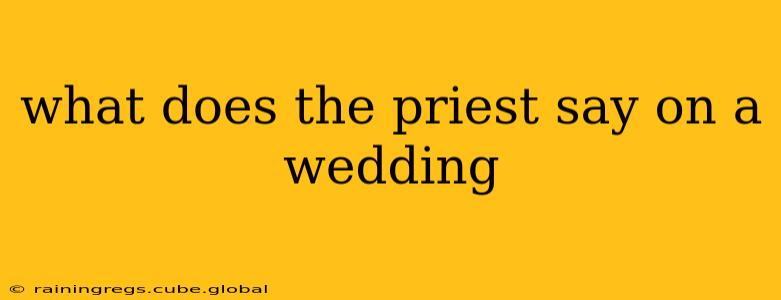What Does the Priest Say at a Wedding? A Look at the Ceremony's Words
Wedding ceremonies, steeped in tradition and personal expression, vary widely depending on religious affiliation, cultural background, and the couple's preferences. While there's no single, universally recited script, certain common threads weave through most ceremonies, regardless of faith. This exploration delves into the typical pronouncements and significant phrases a priest (or officiant) might utter, answering common questions surrounding this pivotal moment.
What are the main parts of a wedding ceremony?
Most wedding ceremonies, whether religious or secular, follow a similar structure:
-
Opening Remarks/Welcome: The officiant welcomes guests and sets the tone for the ceremony. This often includes a brief acknowledgement of the significance of the occasion and the couple's journey.
-
Readings: Readings from religious texts (like the Bible or Torah), poems, or literary works are often incorporated to add depth and meaning to the celebration. The choice of readings reflects the couple's beliefs and values.
-
The Vows: This is the heart of the ceremony. The couple, either reciting pre-written vows or exchanging personalized vows, publicly declares their commitment to one another. These vows form the legal and emotional core of the marriage.
-
The Pronouncement: After the vows are exchanged, the officiant typically declares the couple officially married, using phrasing that varies according to their faith and tradition. This is the legal culmination of the ceremony.
-
Closing Remarks/Blessings: The officiant concludes the ceremony with a blessing, a message of hope and well-wishing for the couple's future together. This can be a brief statement or a more elaborate reflection on marriage and commitment.
What are some common phrases used by priests in wedding ceremonies?
The exact wording varies greatly, but common themes and phrases emerge across different religious traditions:
-
"We are gathered here today..." This is a very common opening phrase, establishing the purpose and context of the gathering.
-
Phrases emphasizing the sacredness of marriage: Depending on the religion, the officiant might use language emphasizing the sanctity of marriage as a covenant, a sacrament, or a lifelong commitment.
-
"Do you take this person..." This is the crucial question posed to both partners, signifying their individual consent to the marriage.
-
"I now pronounce you husband and wife/man and wife/married..." This is the pivotal moment when the officiant declares the marriage legally and officially complete. Alternative phrasing such as "I now pronounce you spouses" or "By the power vested in me..." may also be used.
-
"You may kiss the bride/groom." This time-honored tradition follows the pronouncement and symbolizes the couple's union.
What does a Catholic priest say at a wedding?
Catholic wedding ceremonies involve a more structured and liturgical approach. The priest will often incorporate prayers, readings from scripture (usually from the Book of Genesis, the Song of Solomon, or the letters of St. Paul), and the recitation of vows. The key distinctions often lie in the emphasis on the sacramentality of marriage and the inclusion of specific prayers and blessings. The pronouncement will explicitly state the couple's union as a sacrament.
What do other denominations say?
Other denominations, like Protestant churches, may have simpler ceremonies, with less emphasis on specific liturgical elements. The focus might be more on the couple's personal vows and the exchange of rings, with a less formal structure and wording.
What if the wedding is not religious?
Secular or non-religious ceremonies are increasingly popular. These often incorporate personalized elements, readings chosen by the couple, and vows that reflect their individual beliefs and values. The officiant, often a friend, family member, or professional celebrant, will customize the language and structure to suit the couple's preferences. The key legal elements remain – the exchange of vows and the official declaration of marriage.
In conclusion, the words a priest or officiant speaks at a wedding are tailored to the specific context. While variations abound, the central themes of commitment, love, and the beginning of a new life together remain consistent across diverse cultures and faiths.
